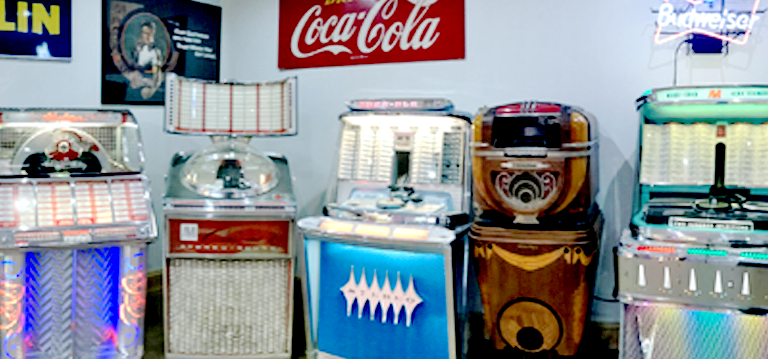There’s something which we loved, that was an important part of our lives and virtually omnipresent in every pub we drank in. The best was an education. What is it?
Jukeboxes, that’s what. Think about it, when was the last time you heard one? And when was the last rock jukebox you heard? I bet it was a long time ago, but at one time it was an integral part of our life’s furniture.
They were so important that when you came across a good one, it became a planet you orbited around. A good jukebox could make or break a pub’s popularity. In Newcastle the Farmers Rest was a typical plush carpeted pub, but it had a rock jukebox, so it was occupied by hippies, bikers and metalheads along with all their mates.
In the 1970s and 80s jukeboxes provided a crucial platform offering an affordable way for people to enjoy their favorite tunes and new music outside of the home.
The jukebox became a focal point, sparking conversations and adding to the overall atmosphere of these social spaces. The first time I heard Never Say Die by Black Sabbath was in the Percy Arms. The Haymarket, to all intents and purposes an old gadgee’s pub had a great jukebox so one half, ‘the lounge’ was all hair and denim. I still remember I loved a song called In The City by a band called Bullfrog. Try as I might, I still haven't found a copy. Perhaps they were a private pressing. Beckett was local and I remember Little Girl by them was on there. The Talbot pit in Stockton was perhaps the best I ever knew featuring the likes of Van Halen, Frigid Pink, Dylan, The Doors, Deep Purple and many others. It was a musical education for a 16 year-old and incredibly loud.
For teenagers and young adults jukeboxes were more than just music players; they were cultural touchstones. Choosing a song was a statement, a way to express individuality and connect with peers. The shared experience of listening to a favorite track in a public space created memories and a sense of belonging. A way to show off your taste even. The culture of listening to your own playlist by yourself wasn’t a thing, everything was communal. How many times would someone say ‘they’ve got a good jukebox’ as a recommendation for a pub? Remember trying to impress a girl by your jukebox choice? That might have just been me.
The thing was, all these bars were packed most of the time. Drinking was affordable and I don’t think I knew anyone who drank at home, unless it was a big ‘Party Seven’ after the pub shut. So if you put your 10p in and made your selection, there were hours of records ahead of you and often you’d never hear your selection or it would come on three hours later out of the blue.
And of course you could be the cool kid and play b-sides. There was a pub, I think it was in Percy Main which stood alone in a devastated area by the Tyne in 1980. It looked like every boozer you’ve ever seen. But the landlord was obviously a long hair. Incredibly he had long forgotten and obscure singles by Mountain on and The Groundhogs and even the Keef Hartley Band. Records I’ve never actually seen since. Myself and a mate would walk there just because of the jukebox, drinking pints of Exhibition just sitting there marvelling at the obscure selections like House Of The King by Focus.
As the 80s progressed, they went from actual records to CDs and often you could play a whole album. Then there were video jukeboxes but they were too distracting. Back in the day, they were mostly wall mounted but some looked like a massive amplifier and were bass heavy monsters. I never knew anywhere that had the classic Rock-o-La style one.
It’s hard to convey now just how culturally important the jukebox was and how alienating it was if somewhere filled theirs with chart music.
Sidebar
How culturally important the jukebox was...



